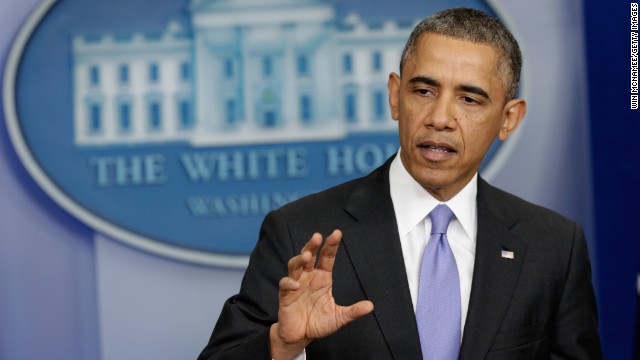STORY HIGHLIGHTS
- Gloria Borger: How could the President not have known of the Obamacare website flaws?
- She says Obama prefers a "no-drama" White House in which people stay in their lanes
- Staffers are not encouraged to bring the President bad news, she says
- Borger: There was no rollout czar for Obamacare; everyone stayed in their silo
Alan: No one was assigned the role of roll-out czar. And lacking some one person whose job description was to coordinate everything -- and blow whistles if necessary, there were only a host of "shop floor managers" and no one to chest thump. Tom Daschle would have been perfect for the job. Smart fellow that he is, it's surprising he didn't put himself forward.
Excerpt: "It's a real head-scratcher. Most powerful man in the world. Most important issue. Most politically explosive, particularly coming on the heels of the government shutdown. Consider the context: Republicans had just tried to defund Obamacare, and they lost in a heap of public humiliation. So the rollout of Obamacare had to be really impressive, because the Republicans had to be proven wrong. And yet, as the dry runs continued to produce red flags -- over and over -- the President remained in his steely cocoon."
By Gloria Borger, CNN Chief Political Analyst
November 14, 2013
(CNN) -- As the story of the Obamacare website fiasco unfolds, senior administration aides tell me that the President is "mad, frustrated and angry."
Mad that his signature legislative achievement is stuck at the gate, frustrated that he's running out of time to fix it and angry that he's got a second-term agenda now going nowhere. He's so furious, in fact, that he stepped out of character to vent to an assembled group of top aides, saying he would have delayed the website if he had known it was a mess.
By Thursday, the president was venting publicly. "Had I been informed, I wouldn't be going out saying, boy, this is going to be great. You know, I'm accused of a lot of things, but I don't think I'm stupid enough to go around saying, this is going to be like shopping on Amazon or Travelocity, a week before the website opens, if I thought that it wasn't going to work."
All of which begs the real question: How could he not have known?
It's a real head-scratcher. Most powerful man in the world. Most important issue. Most politically explosive, particularly coming on the heels of the government shutdown. Consider the context: Republicans had just tried to defund Obamacare, and they lost in a heap of public humiliation. So the rollout of Obamacare had to be really impressive, because the Republicans had to be proven wrong.

Gloria Borger
And yet, as the dry runs continued to produce red flags -- over and over -- the President remained in his steely cocoon. If this were the presidency of George W. Bush or Ronald Reagan, the obvious theories would abound: The chief executive is disengaged. Or incurious. Or worse. But since Obama is none of the above, what gives?
This much is clear, after speaking with both past and present senior administration officials: No one was really in charge, so no one knew for sure how bad the overall picture was. What's more, and -- perhaps most telling -- no one wanted even to hint to the President that this techno-savvy administration possibly had a website stuck in, say, 1995. "People don't like to tell him bad news," says an ex-White House staffer. "Part of it is the no-drama culture."
Oh, that. The infamous no-drama Obama credo: no panic, no drama. "No drama is attractive to people, except there are times when people actually should light their hair on fire," says one former senior administration official. "That would have been a very good thing."


Indeed. People who have served in top jobs at the White House seem to agree on one thing: a President who wants to get at the truth has to understand the extent of his own isolation. And then establish a zone of immunity for truth-tellers.
That, of course, presumes that the top staff inside the White House knew the full truth. And that probably wasn't the case. Again, you ask, how can that be? Answer: The operation resembled the proverbial blind men and the elephant parable: Everyone seemed to touch a part of it, but no one could really see the whole picture, or disaster coming right at them.
"It's not that someone had an envelope with a note in it saying here comes the second-term crisis," an ex-top White House staffer says. "They were thinking there were some bugs, they would be fixed; these are smart people."
They may be smart, but it appears they had no singular leader. No rollout czar. They had health care wonks and tech wonks and political wonks and even a presidential wonk, but no put-it-all-together-and-make-sure-it-all-works wonks.
And maybe, no truth-telling wonks, who would have warned the president that it was a no-no to promise that people could keep their health care policies.
Everyone, it seems, lived in his own silo. And that's where they stayed.
This is a President, says one admirer, "who likes everyone to stay in his lane." Which begs the question: Whose lane was it to say the website wasn't working? The probability is that the information filtered to a bunch of different people in a bunch of different lanes.
Sure, the stay-in-your-lane theory of operation is important to a well-run White House, but here's the flip side if it's implemented too literally: If you hear something outside your purview that is bad, you may not want to report it higher. Why? "Everyone thinks if it isn't in my lane, and I talk about it, I'm being a tattletale," says one ex-administration official. "That would be discouraged as bad behavior in this current White House." (An exception, some point out, ex-chief of staff Rahm Emanuel, who "encouraged people to contradict each other." To put it mildly, Rahm was pro-drama.)
Which brings us to the President, who isn't. And if you aren't 100% sure that the website is a mess -- because no one is actually in charge to tell the White House with any certainty -- what is there to bring to the President? Reports of some bad tests? Bugs? Fixes that are being made?
"Nobody is trying to create drama, angst and anxiety," says an ex-White House official. "And it's hard to go in there and say, 'Well, I don't think this is going to work.' "
So, the irony. All the effort to spare the drama created a huge theatrical mess all of its own. The reviews are lousy, and now the unhappy leading man is stewing, centerstage.

No comments:
Post a Comment